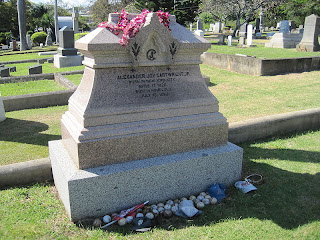 Larry Dierker was a hell of a young pitcher for the old Colt .45s, current Astros. He was probably abused (1250 innings through age 23, 305 innings as a 22 year old in 1969). And by all accounts, he was a pretty good manager too, finishing first in the NL Central in four of his only five seasons at the helm. Dierker has also been a special columnist for MLB.com for several years now.
Larry Dierker was a hell of a young pitcher for the old Colt .45s, current Astros. He was probably abused (1250 innings through age 23, 305 innings as a 22 year old in 1969). And by all accounts, he was a pretty good manager too, finishing first in the NL Central in four of his only five seasons at the helm. Dierker has also been a special columnist for MLB.com for several years now.  Alas, one thing Dierker is not is a historian. On a recent flight to Hawaii, Dierker was reading The Man Who Invented Baseball by Sports Illustrated writer Harold Peterson, a 1973 biography of Alexander Cartwright. Impressed by Cartwright and the book, Dierker shared the following,
Alas, one thing Dierker is not is a historian. On a recent flight to Hawaii, Dierker was reading The Man Who Invented Baseball by Sports Illustrated writer Harold Peterson, a 1973 biography of Alexander Cartwright. Impressed by Cartwright and the book, Dierker shared the following, “The sporting-club games [of the New York Knickerbockers] continued through the fall and resumed in the summer of 1846, when the Knickerbockers played the first recorded game against another sporting club…on June 19 in Hoboken. Several prominent gentlemen from the early days of the sport, Albert Spaulding [sic] and John Montgomery Ward, also took part in the action.”The trouble, of course, is that Spalding wasn’t born until 1850, and Ward not until 1860, making their participation highly difficult (unless they were good friends of H.G. Wells).
 Later, Dierker writes,
Later, Dierker writes, “In 1888, the White Sox went on a world tour and played the Cubs in Honolulu, never knowing that the founder of the sport was living there. Until that time, the inventor of baseball was thought to be Abner Doubleday….That version of the origins of the sport was based largely on the eyewitness testimony of Abner Graves.”Alas, there’s trouble here too. Indeed, Spalding did organize a goodwill International tour in 1888, which did stop in Hawaii. However, the teams could not play there, as they arrived late, were prohibited from playing on a Sunday, and had to leave immediately for New Zealand. Also, the Chicago team that Spalding brought along was the White Stockings, forerunners of the Cubs. Against them, he pitted a team of “All Americans” that included Ward, Ned Hanon, and George Wright. Finally, nothing whatsoever was known about Doubleday in 1888. The Mills commission, which received Graves’ letter attributing the sport’s invention to Doubleday, wasn’t established until 1905. In 1888, the origins of baseball were shrouded in mystery, though American owners and players felt sure that there were no connections to Britain’s game of Rounders.
Dierker’s assertions call to question whether he was actually paying attention to what he was reading on his long flight to Oahu, or whether Peterson’s book is simply hopelessly incompetent. Indeed, there is little known about Peterson’s out-of-print book online, save for a positive review on SI.com, which claims, “Peterson…provides an extraordinary analysis of baseball's distant origins, tracing the game back not to cricket but to a Scandinavian game even older than om el mahag, a ball-and-bat diversion of Africa's Berbers dating from 3,000 to 6,000 years before the birth of Christ. He unearths later variations that cropped up in France, Germany and elsewhere, eventually to reach their exquisite culmination on that spring day in Cartwright's marvelous invention.” Certainly, it’s hard to believe that SI.com would lend its support to a writer who is so misinformed as to think that John Ward and Al Spalding could have attended a game in 1846. If any of you have actually read the book, feel free to fill us in.
 Maybe the Astros abused more than just Dierker’s arm back in ’69. Or maybe some overhead luggage shifted during the flight and conked him on the noggin. Dierker, by the way, has written two books on his own, including the now ironically titled, This Ain't Brain Surgery (no, apparently it's not) pictured to your right. The mind reels at what inaccuracies could potentially be contained within (or invented, given the right amount of chemical stimulation).
Maybe the Astros abused more than just Dierker’s arm back in ’69. Or maybe some overhead luggage shifted during the flight and conked him on the noggin. Dierker, by the way, has written two books on his own, including the now ironically titled, This Ain't Brain Surgery (no, apparently it's not) pictured to your right. The mind reels at what inaccuracies could potentially be contained within (or invented, given the right amount of chemical stimulation).As it is, at least Dierker will get to accomplish his closing wish, “If I can establish that Alick’s grave is still there [in Honolulu], I will likely allow enough time to stop by and place a lei on it myself.” A quick Googling, which is really all Dierker and his factcheckers at MLB.com should have done to see if he was even in the ballpark for some of his ridiculous assertions, suggests that, indeed, the site is in good shape.

At this rate, however, Dierker will probably end up in the wrong cemetery and declare the whole thing a snipe hunt. Have fun, Larry!

1 comment:
Thanks for holding Mr. Dierker accountable, TCM. There should be special fact checkers for former athletes.
Post a Comment